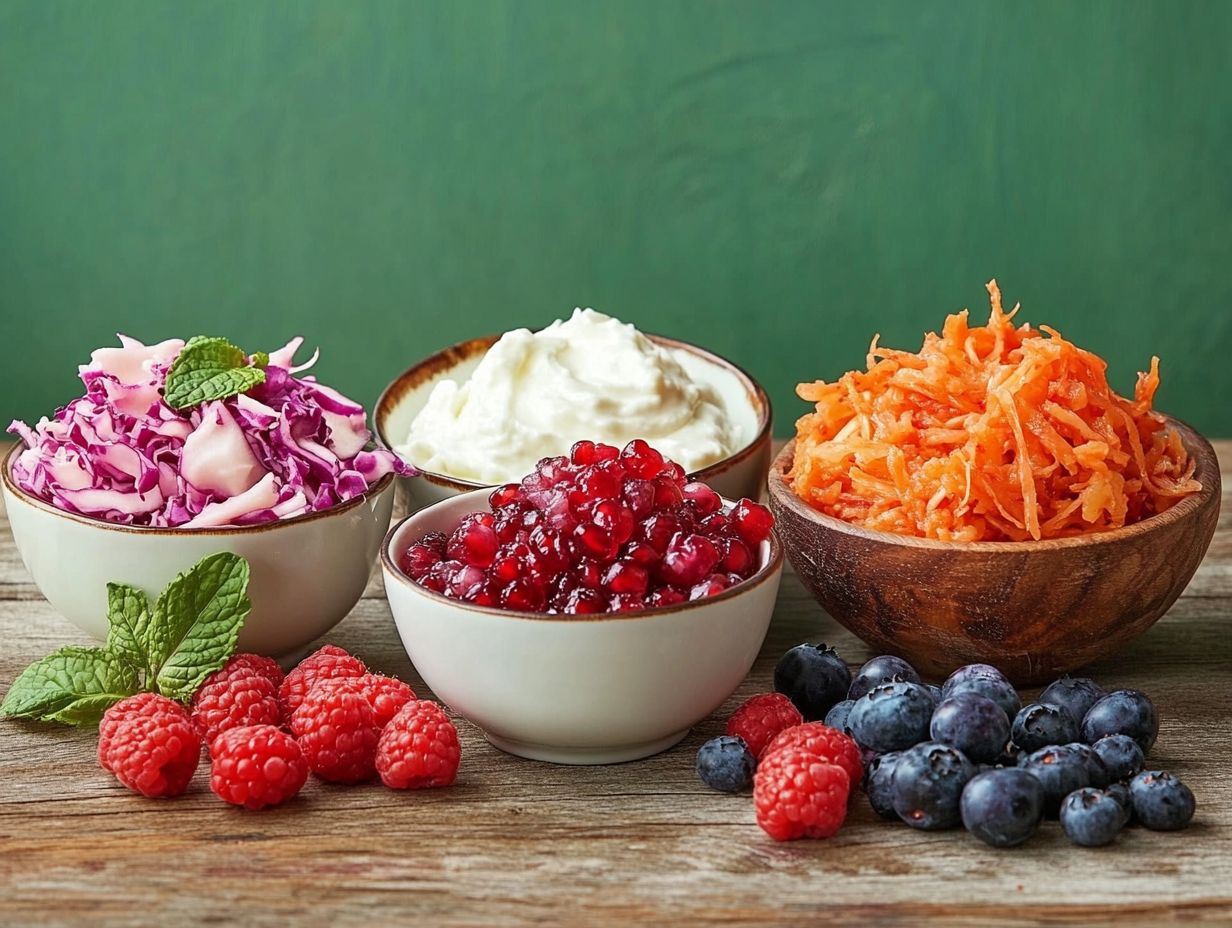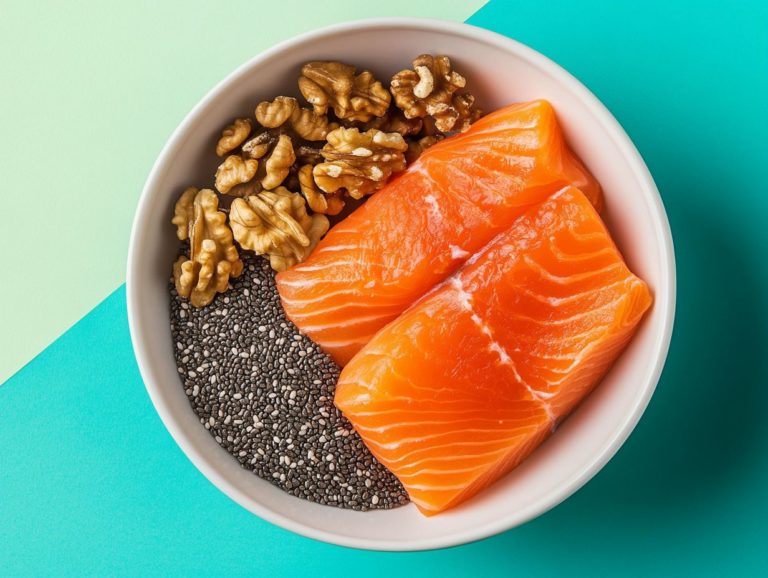The Role of Probiotics in Mental Health
In recent years, you may have noticed the growing spotlight on the connection between gut health and mental well-being. This connection reveals how your gut can influence your mood, anxiety levels, and even cognitive function.
Let s explore how probiotics can boost your mood and help manage depression while enhancing cognitive abilities.
Discover how to choose the best probiotic supplements for your needs today. You ll also learn how to seamlessly incorporate them into your diet and adopt lifestyle habits that support gut health.
Explore with us how nurturing your gut can pave the way for a happier, healthier mind.
Contents
Key Takeaways:

- Probiotics can positively impact mental health by improving mood, reducing anxiety, managing symptoms of depression, and enhancing cognitive function.
- Choosing the right probiotic supplement involves considering factors such as strain, dosage, and overall gut health.
- Incorporating probiotics into your diet through food sources like yogurt, kefir, and fermented vegetables, along with lifestyle habits, can support both gut and mental health.
The Gut-Brain Connection
The intricate relationship between gut health and mental health is becoming increasingly evident, thanks to research into the gut-brain axis. This area of study reveals how your gut microbiota the community of microorganisms in your gut can significantly influence your psychological well-being, particularly regarding mood disorders such as anxiety and depression.
The connection is largely mediated by neurotransmitters, which are chemicals that transmit signals in the brain, and stress hormones, crucial players in shaping emotional reactions and overall mental health. Emerging studies suggest that nurturing a healthy microbiome could yield substantial psychological benefits.
Therefore, grasping this connection is more vital than ever, not only for effective mental health treatments but also for adopting holistic wellness approaches. Understanding this interplay can enable you to enhance both your mental and physical well-being.
The Benefits of Probiotics for Mental Health
Probiotics, especially strains like Lactobacillus rhamnosus, have gained considerable attention for their potential to enhance mental health by improving gut health. Research into probiotics that affect mental health reveals that these beneficial bacteria can effectively modulate gut microbiota, leading to significant improvements in mood disorders, anxiety, and even symptom management for various mental illnesses.
By tackling gut inflammation and strengthening gut health through probiotic foods and supplements, you may experience notable psychological benefits, reinforcing the vital connection between gut health and emotional well-being.
Improving Mood and Reducing Anxiety
Improving your mood and reducing anxiety through dietary interventions is gaining traction, thanks to research highlighting the pivotal role of probiotics in gut health. This connection reveals how specific probiotic strains can influence neurotransmitter levels tied to emotional regulation, allowing for a more balanced emotional state and diminished feelings of anxiety.
Recent studies indicate that probiotics, particularly those abundant in Lactobacillus and Bifidobacterium, can positively affect serotonin production often dubbed the ‘feel-good’ neurotransmitter. This physiological interaction emphasizes the gut-brain axis, where your gut microbiota plays a vital role in the signaling pathways that govern mood and stress responses.
If you re eager to incorporate these beneficial bacteria into your daily routine, consider options like yogurt, kefir, sauerkraut, and probiotic supplements. Strive to include a variety of these sources to enhance gut diversity, which may further strengthen your emotional well-being and resilience against anxiety.
Managing Symptoms of Depression
Managing depression symptoms through taking probiotics is an intriguing area gaining traction. Research suggests that a type of probiotic that affects mental health can significantly influence your levels of depression by enhancing gut health and reducing gut inflammation. This connection opens up exciting possibilities for addressing emotional responses and improving your overall mental well-being.
Recent studies have highlighted specific strains like Lactobacillus and Bifidobacterium, which can alter the composition of your gut microbiota. This alteration may alleviate symptoms of depression by modulating the connection between your gut and brain. In a clinical trial involving participants with moderate to severe depression, those who incorporated these probiotics into their diets reported a noticeable decrease in depressive symptoms compared to those in the placebo group.
These strains help reduce gut inflammation and boost the production of neurotransmitters like serotonin, a key player in mood regulation. By diving into these promising avenues, healthcare practitioners could craft more holistic approaches to support your emotional well-being.
Enhancing Cognitive Function

Enhancing your cognitive function through gut health is an exciting frontier in research. It suggests that probiotics are essential for optimizing neurotransmitter levels influenced by gut microbiota, ultimately shaping mental health treatments and sharpening cognitive clarity. By prioritizing gut health, you might find yourself enjoying improved focus, better memory retention, and overall enhanced cognitive performance.
Recent studies have highlighted the importance of the connection between your gut and brain, showing how beneficial bacteria can positively impact neurotransmitter production, particularly serotonin and dopamine. For example, a trial with adults revealed that those who supplemented with specific probiotic strains over several weeks experienced noticeable improvements in mood and cognitive flexibility.
Maintaining a healthy balance of gut microbes supports physical well-being and plays a crucial role in mental sharpness. This remarkable connection could redefine how cognitive health is approached in both clinical environments and daily life.
Choosing the Right Probiotic Supplement
Finding the right probiotic can be a game-changer. Selecting the appropriate probiotic supplement is crucial for enhancing your gut health and, consequently, your mental well-being.
Different strains, like Lactobacillus rhamnosus, provide distinct health benefits that can significantly impact your overall health. Recognizing the value of bacterial diversity in supplements allows you to make informed choices that align with your specific health objectives, especially when tackling mental health issues.
Factors to Consider
When selecting probiotic supplements, consider several key factors to ensure their effectiveness and maximize their health benefits. Pay attention to the specific bacterial strains involved and their documented impacts on both gut health and mental well-being.
Focus on strain diversity, as various probiotics provide distinct advantages and operate in unique ways within your digestive system. Checking the colony-forming units (CFU) count will offer insight into the potency and viability of the probiotics, which is crucial for achieving the desired effects.
Including prebiotics also enhances the benefits by nourishing the probiotics themselves, promoting more effective colonization in your gut. Look for scientific validation through clinical research to bolster your confidence in these supplements, underscoring the importance of education as you navigate the vast array of options available on the market.
Incorporating Probiotics into Your Diet
Incorporating probiotics into your diet is both enjoyable and rewarding, especially through a diverse array of probiotic-rich foods. Fermented options like yogurt and kefir stand out, enhancing your gut health and supporting your mental well-being.
By diving into creative recipes and meal ideas, you can seamlessly weave these beneficial foods into your daily nutrition, elevating both your meals and your overall health.
Don’t wait to improve your mental health; start incorporating probiotics today!
Food Sources of Probiotics
Probiotic foods serve as an exceptional source of beneficial bacteria that nurture your gut health. Fermented options like yogurt and kefir particularly shine with their abundant probiotic content. By incorporating these foods into your diet, you can significantly enhance your gut microbiota and contribute to your overall well-being.
These products boast unique strains such as Lactobacillus and Bifidobacterium, celebrated for their essential roles in digestion and immune support. You can also explore options like sauerkraut, kimchi, and miso, which not only add delightful variety and flavor to your meals but also introduce different beneficial strains to diversify your gut flora.
Imagine stirring a scoop of kefir into your morning smoothie, topping your salad with a spoonful of sauerkraut, or enriching your soup with miso. These simple additions can seamlessly integrate into your daily routine. Get creative! Try making your own fermented drinks at home for a fun twist!
Recipes and Meal Ideas

Creating delicious recipes that incorporate probiotic foods like yogurt and kefir elevates both the flavor and health benefits of your meals. This makes it easier for you to enhance gut health and support mental well-being. Innovative meal ideas can inspire you to embrace these nutritious options every day.
As you explore a variety of recipes showcasing these beneficial ingredients, you’ll discover how seamlessly they can be integrated into breakfast, lunch, dinner, and even snacks. For instance, starting your day with a smoothie that includes kefir and fresh fruits offers a refreshing, nutrient-packed boost. In the afternoon, a yogurt parfait layered with granola and berries serves as a satisfying snack.
For dinner, consider a stir-fry featuring fermented vegetables, which adds flavor and digestive benefits. These combinations make your meals more enjoyable while ensuring that essential probiotics are part of your balanced diet.
Other Ways to Support Gut Health
Supporting your gut health goes beyond just what you eat; specific lifestyle habits are equally essential in maintaining a thriving gut microbiome and alleviating psychological symptoms linked to gut inflammation.
By grasping concepts like how easily substances pass through your gut walls and the importance of stress management, you can adopt a holistic approach that significantly enhances your overall well-being.
Lifestyle Habits and Practices
Adopting healthy lifestyle habits is essential for promoting gut health. Factors like stress management and regular physical activity directly influence the efficiency of your gut microbiome and can also alleviate psychological symptoms.
In today s fast-paced world, maintaining these habits is more crucial than ever. Regularly engaging in activities whether it s walking, yoga, or even dancing not only strengthens your body but also releases endorphins that combat stress and uplift your mood.
Integrating mindfulness practices, such as meditation or deep-breathing exercises, can significantly reduce anxiety and cultivate a sense of calm. Establishing a consistent routine that includes a balanced diet rich in fiber and fermented foods is crucial for nurturing your gut flora.
These holistic approaches enable you to feel more energized, resilient, and mentally balanced, effectively fostering both your digestive and emotional health.
Frequently Asked Questions
What are probiotics and how do they impact mental health?
Probiotics are live microorganisms that provide health benefits when consumed. They can improve mental health by promoting the growth of good bacteria in the gut, which can influence brain function and mood.
Discover more tips to boost your gut health and overall wellness!
Can probiotics be used to treat mental health disorders?

Probiotics show promise in improving symptoms of some mental health disorders. However, they should not replace primary treatments.
How do probiotics affect the gut-brain axis?
The gut-brain axis connects the gut and the brain. Probiotics can influence this connection by producing neurotransmitters and other compounds.
What are some mental health conditions that probiotics may benefit?
Probiotics may help with conditions like depression, anxiety, and autism spectrum disorders. Early studies are promising, and the results are exciting!
Are all probiotics the same?
No, different probiotic strains affect the body in various ways. Consulting a healthcare professional is key to finding the right one for you.
Can everyone take probiotics for mental health?
Probiotics are generally safe for most people. Those with weakened immune systems or severe health issues should consult a doctor first.
Some individuals might experience side effects, like bloating or diarrhea. Start with a low dose and gradually increase to avoid discomfort.






